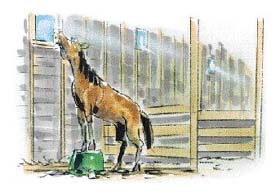|
with products to control odor will handle the threat. Daily cleaning of
stalls is a must. But how you control odors does matter. For example, hydrated lime, which is caustic, can cause problems for mature horses and is very risky with foals. The substance can burn the soft part of a horse's hoof, and lime dust poses difficulty for the horse's respiratory system and eyes.
Natural desiccants that absorb water without breakdown -- thereby extending bedding
life -- make good sense.

The better ammonia-absorbing products effectively eliminate the odors at their source by locking up the molecules of ammonia and hydrogen sulfide -- or, in some cases, changing the bacteria population -- so less ammonia is released into the air. Several products on the market are natural, non-toxic and non-caustic. One either sprays or sprinkles the ammonia-absorbing products on the stall floor, concentrating especially on the wet areas.
Besides better smells, you'll enjoy the added benefit of lessening the fly population in the barn and adjacent areas by creating an inhospitable environment for insect egg-laying and maggot growth. When buying an ammonia-controlling product, consider your objectives -- less dampness, less ammonia, safety (non-toxicity), economy and environmental compatibility.
|
Ventilation helps horses breathe
When it gets cold, the temptation is to keep your horse barn as airtight as possible to keep your horses cozy. That's unwise. Proper ventilation keeps healthy, fresh air moving in the barn to remove odors and stale air.
Use common sense. If you have stall windows, open them. If you have doors, open them. Strive for cross-ventilation. Fresh air has never hurt a horse, but dusty, stale air can. The trick is to have fresh air without the barn being drafty and uncomfortable.
If you have a full loft, put a window in each stall to allow for cross-ventilation. You might also want to consider having doors at each end of the barn that can be left all or partially open, depending on the weather.
Horse Handbook: Housing and Equipment offers detailed suggestions for adding ventilation. It's available for $7 through Northeast Regional Agricultural Engineering Service, 152 Riley Robb Hall, Cornell University, Ithaca, NY 14853, (607) 255-7654.
|

|